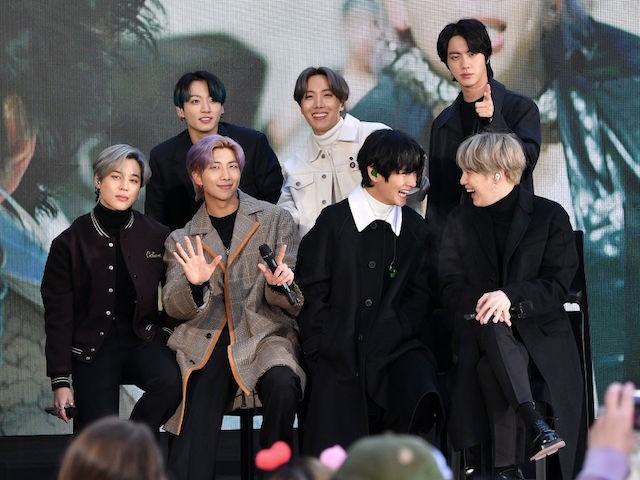North Korean government media outlet Arirang Meari published an attack on South Korea’s pop music industry, or “K-pop,” this week, claiming South Korean record labels are enslaving artists.
The article mentioned by name Korea’s most popular musical act, BTS, or Bangtan Sonyeondan, who recently became the first Korean musical artist to receive a Grammy award nomination. The boy group has become a cultural sensation around the world and is suspected to be illicitly popular in North Korea, where citizens often smuggle USB keys filled with South Korean music, television, and movies to watch illegally. All media not created by the North Korean communist state is illegal to consume in the country.
The article also reportedly mentioned BlackPink, a South Korean girl group that has met with outsized success in the United States, leading to collaborations with American artists like Lady Gaga and Cardi B.
North Korean media targeted not the artists, but their record labels, for allegedly exploiting the artists, according to a translation by NK News. The attacks follow several attempts by Chinese state media to condemn BTS for making comments in favor of the U.S. military and to condemn BlackPink members for allegedly handling pandas in an inappropriate manner.
“Most of the juvenile singers, including BTS and Blackpink, reportedly sign contracts with entertainment industry conglomerates such as SM Entertainment at a young age,” a column in Arirang Meari, a Korean-language state newspaper, claimed this weekend. “These South Korean juvenile singers are tied to unfair contracts and detained at training facilities, and that they are being deprived of their body, heart and soul while being treated as slaves by malicious and corrupt entertainment industry conglomerate bosses.”
BTS is signed to Big Hit Entertainment and BlackPink is signed to YG Entertainment. Neither have ties to SM Entertainment.
The article — titled “South Korean Youth Singers Subordinate to Large Corporations, Forced into Miserable Life” — goes on to accuse the record labels of forcing the singers to “entertain sexually” politicians and wealthy businessman, without offering evidence, and that some resort to suicide, which has become a growing concern in the K-pop industry.
SM Entertainment has become notorious for running one of South Korea’s most rigorous pop music training academies, described as “boot camps” where minors learn singing, dancing, choreography, foreign languages, and publicity skills. SM was one of the first major labels to pioneer the electronic sound known today as K-pop, but has since ceded much of the market to YG, which has also faced significant controversy after a member of its most popular boy group, BigBang, was arrested on charges of facilitating prostitution. SM was home to two of the highest-profile suicides in the K-pop industry: that of Jonghyun, a member of the group SHINee, in 2017; and of Sulli, a member of the group f(x) in 2019. Jonghyun was 27 years old; Sulli was 25.
Researchers speaking to NK News speculated that the attack on the K-pop industry may be a response to the music’s popularity in the country.
“North Korea writing these types of articles shows that [Pyongyang] thinks it has become difficult to completely block off the distribution of K-pop music,” Sang-sin Lee, a research fellow at the Korea Institute for National Unification (KINU), told the outlet. “So, they are working on producing some sort of counterintelligence, claiming that these popular songs are being made under poor conditions — ‘slave-like’ exploitation of young trainees.”
Lee noted that, through smuggling in flash drives, North Koreans are aware of major milestones in South Korean culture, despite it being illegal for them to know.
“Now, there are a lot of USBs going in,” Lee explained. “So these days, it doesn’t seem North Korea can completely block out outside information. Things like the South Korean movie ‘Parasite’ winning an Oscar or BTS performing at the Grammys — they’d hear about this one way or another.”
Exposure to BTS, in particular, has been behind at least two major arrests in the country in recent memory. In August, another North Korean observer outlet, Daily NK, reported that North Korean authorities arrested three soldiers caught dancing to the BTS song “Blood, Sweat, and Tears,” apparently mimicking choreography from the music video.
“I imitated the decadent South Korean (Korean) dance on the way to learn following the revolutionary spirit of the ancestors,” one soldier reportedly confessed.
Daily NK reported of a similar incident in 2019 of a mass arrest of North Korean citizens after police found a cache of USB drives filled with BTS songs.
“A USB filled with BTS music and South Korean dramas was discovered by North Korean authorities in the house of a former soldier in Hyesan, Ryanggang Province, early last month,” Daily NK reported, citing an anonymous source. “He and others with him were arrested on the spot and are currently in a detention center undergoing a preliminary interrogation by the provincial MSS office.”
Arrests for listening to South Korean music in the country have occurred for years, even after dictator Kim Jong-un personally welcomed a large group of K-pop acts, most prominently the girl group Red Velvet, in 2018. As part of an attempted thawing of relations between Kim and leftist South Korean President Moon Jae-in, South Korea sent a delegation of 150 musicians and other artists, including ten K-pop acts, to Pyongyang in March 2018, a reciprocal trip for North Korean sending a delegation to the South for the Winter Olympics that year. A month later, South Korean media outlets reported mass arrests of North Koreans caught with foreign media, including several minors.
In the administration before Moon’s, that of conservative President Park Geun-hye, South Korea often used K-pop to rankle North Korean soldiers on the mutual border, the Demilitarized Zone (DMZ). In 2016, South Korean soldiers set up loudspeakers to play K-pop across the border for Kim Jong-un’s birthday.

COMMENTS
Please let us know if you're having issues with commenting.